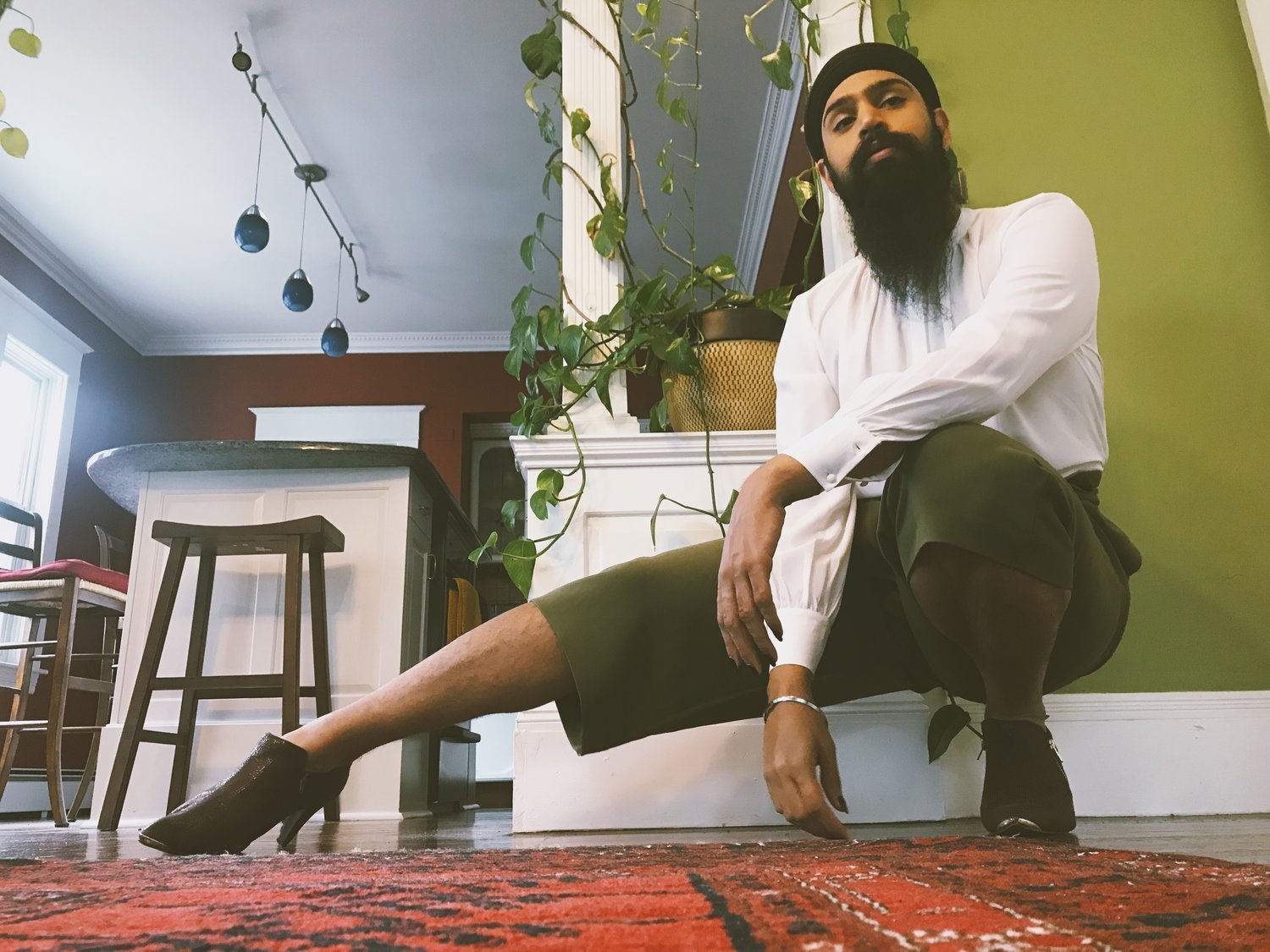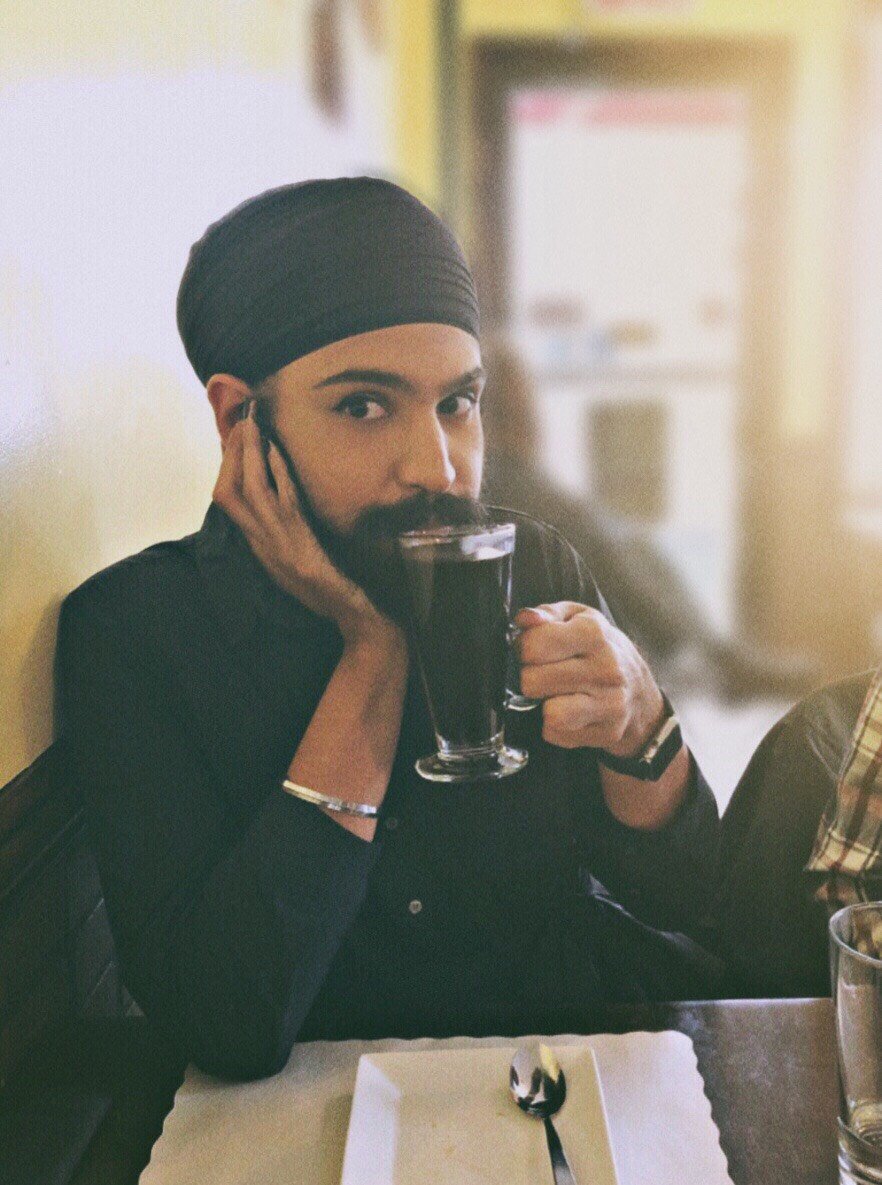Nonbinary, Sikh, and fierce as hell: Interviewing Prabhdeep Kehal
PHOTOS COURTESY OF PRABHDEEP KEHAL
Prabhdeep Kehal is navigating the waters of intersecting identities we’ve previously thought mutually exclusive. Queer, nonbinary, Sikh, and fierce as all hell, they are redefining boundaries once thought to be restrictive or even nonexistent both in their various and wide ranging communities and outside of them. Kehal is a PhD candidate at Brown University, studying Sociology as it relates to their own experience, in all its diverse forms, as well as vastly outside of it.
Through the lenses of intellectualism, the nonbinary experience, and religious practice, Kehal has been able to redefine their own identity, rather than let the world at large do so for them. And that’s something many of us who identify as queer hope to do.
Kehal was lovely enough to answer these questions in the midst of dissertation writing -- a true goddess among us.
What are you currently studying?
My research is animated by questioning the legacies of white supremacy in higher education today. There is a general presumption that these institutions, and society overall, have shaken off the vestiges of our colonial founding, and my work questions that assumption. In other words, if we understand inequality as a product of colonialism, then what role does higher education play in the maintenance of that inequality? At the moment, I'm considering how ideas of valuing and excellence may be embedded within these histories and, to the extent that they are, what does that mean for how we assign value within higher education?
Do you feel like your religious beliefs were at odds with your identity?
I feel like I was told that they were. People told me, and still do tell me, that being Sikh means not being queer, and being nonbinary means I'm white and giving into colonialism. These ideas kept me from claiming my Sikhi and I used to hold a lot of resentment for people thinking they could tell me that I could not be with my Vaheguru (that is how we refer to our divine being, an English translation to 'God' doesn't quite capture it). It was only when I started meeting Sikhs who were my age and existing like how I envisioned myself that I started to realize how narrowly people had defined Sikhi. I take seriously that "sikh", when read as a verb, means “learn.” It makes me feel like a student. I approach the teachings as my guardrails, but not as walls… I am not ever going to try and say that I am the 'right' image of Sikhi. I don't think anyone is. For a long time, I was with collectives that didn't reciprocate the same dignity I was respecting them with, and it was when I stopped engaging with them, that I started feeling Sikhi speaking to me. It was in queer communities that I finally found Sikhi.
What Sikh belief or teaching do you try to live by the most?
There is a core belief that is simply referred to as “vand chhako” or “vand chhakna.” Literally, "vand chhakna" means to share, or consume collectively. This is a powerful teaching to me. It reminds me that I am not to only focus on myself when I consume or take part in things, but also that I am to think about the communities from which I come. I come from a queer & trans community, a Sikh community, a queer & trans Sikh community, a Punjabi community, a Punjabi diasporic community in California, and all the intersections therein... My actions have consequences, good and bad, and I need to think collectively about how my actions and consequences are shared and bound up with my communities.
What challenges have you faced as a nonbinary Sikh person?
People think I don't exist and shouldn't exist. Things are a bit better now, especially as I'm older and have some level of stability, but people feel very entitled to your existence. I've been called a terrorist on the streets, in the dating apps. People fetishize my culture as something for them to play with, usually without my consent. Other Sikhs have tried to shame me back into conformity. It hasn't worked, but I think it's something that will always be there in my lifetime. It's not my unhappiness that makes me face these challenges. It's a society that wants me to be unhappy for who and how I am that creates these challenges.
Who does your support system consist of?
My support system revealed itself to me, I didn't go looking for it. These are the people who, at my times of need, really took seriously what it meant to practice vand chhakna in their own ways. Because they shared their lives and their love with me. Underlying all of this support though, I think the biggest boon over the past few years, as a praxis, has been listening to my body and soul. I realized I spent a lot of my life looking outwards for answers to things I was dealing with, when in fact, my body was telling me exactly what I needed.
What do you hope to bring to the queer community?
For myself, [what I interpret this question to be is:] "what does my existence contribute to the ongoing narrative of queerness?". Defiance. Thriving. Resurgences. Possibilities. These aren't foreign concepts to queer communities, but I think we sometimes forget our roots and people try to erase our roots. Queerness to me is not about wanting or needing approval. I told a friend that what I'd love is for the wall that is being built between Sikhi and queerness to come down, because it is being put there. And my friend asked me, "so people can come over?" and I hesitated. I don't believe forced integration in this regard is what's needed after centuries of anti queerness. I want the wall down so I can breathe. I want people to have safe passage between our worlds. Because it's not necessarily a bad thing to have separate worlds. I think true communities bridge different worlds. Because if we remember these interconnections that do hold us together, then sharing in true community creates amazing new possibilities for the future. That's what I hope to contribute to that future. For the kiddos.
—
Dakota is a poet, journalist, and right in the damn center of the Kinsey scale. Follow her on Twitter: @Likethestates.
Archive
- September 2025
- August 2025
- May 2025
- February 2025
- November 2024
- October 2024
- September 2024
- August 2024
- July 2024
- June 2024
- May 2024
- April 2024
- October 2023
- July 2023
- June 2023
- May 2023
- April 2023
- March 2023
- February 2023
- June 2022
- April 2022
- March 2022
- January 2022
- December 2021
- October 2021
- September 2021
- August 2021
- July 2021
- June 2021
- May 2021
- April 2021
- March 2021
- February 2021
- January 2021
- December 2020
- October 2020
- September 2020
- August 2020
- July 2020
- June 2020
- May 2020
- April 2020
- March 2020
- February 2020
- January 2020
- December 2019
- November 2019
- October 2019
- September 2019
- August 2019
- July 2019
- June 2019
- May 2019
- April 2019
- March 2019
- February 2019
- January 2019
- December 2018
- November 2018
- October 2018
- September 2018
- August 2018
- July 2018
- June 2018
- May 2018
- April 2018
- March 2018
- February 2018
- January 2018
- December 2017
- November 2017
- October 2017
- September 2017
- August 2017
- July 2017
- June 2017
- May 2017
- April 2017
- March 2017
- February 2017
- January 2017
- December 2015
- November 2015
- October 2015
- September 2015
- August 2015
- July 2015
- June 2015
- May 2015
- April 2015










